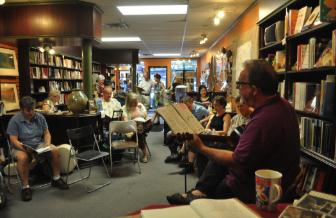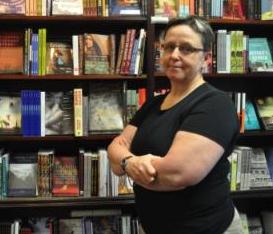
A June 29 reading at Ottawa's Mother Tongue bookstore. Credit: Andi Schwartz

Sean Zio hosted creative-writing workshops at Mother Tongue Books. Credit: Kandace Blaker
More than 20 people gathered at Ottawa’s Mother Tongue Books June 29 to say goodbye to the store, but first, to celebrate its existence.
Owners Laura Rayner and Evelyn Huer were joined by Arthur McGregor of the Ottawa Folklore Centre, who led the group in a sing-along of uplifting folk songs. Earlier, members of a creative-writing workshop, held every Tuesday at Mother Tongue, shared some of their work.
After listening to the writers, Rayner turned to the group: “Try getting that on your Kindle,” she said.
After all, women’s bookstores, whose demise can largely be attributed to the rise of e-readers and online stores, have always been about connecting community.
They began emerging in the 1970s as one fixture of the women’s movement. These often volunteer-run shops functioned as spaces for women to explore feminism, for women writers to gain exposure, and as a way for feminist communities to connect in a pre-internet age.
From the 1960s into the early 1980s, women writers, both old and new, were being discovered more than ever before, according to Margaret Philips, owner of the Northern Woman’s Bookstore in Thunder Bay, Ontario.
“They weren’t being published by mainstream publishers, so feminist publishers developed. They weren’t being distributed in mainstream stores, so it was necessary for women’s bookstores to open,” she says.
In 1973, Canada welcomed both the Vancouver Women’s Bookstore and the Toronto Women’s Bookstore, with more shops opening in the ’90s.
According to the feminist website Section15, North America was once home to more than 150 women’s bookstores.
However, Mother Tongue is not the only, nor the first, of these forced to close its doors. In 2009, staff at the Toronto Women’s Bookstore tweeted that there are now just 21 women’s bookstores left in the world, as opposed to the 125 that were operating in 1994.
Section15 states that stores in Calgary, Hamilton, London, Sudbury and Saskatoon have all closed since 2004. Women in Print, a women’s bookstore in Vancouver, closed in 2005. Meanwhile, the Toronto Women’s Bookstore faced a serious financial crisis in 2009 and asked the community for donations in order to stay afloat.
With Mother Tongue’s impending closure, the Toronto Women’s Bookstore and the Northern Woman’s Bookstore will be the last dedicated women’s bookstores left in Canada. Other independent stores, like Venus Envy in Ottawa and Halifax, carry similar titles and share similar politics but cater to a slightly different community.
Victoria Moreno took ownership of the Toronto Women’s Bookstore, along with its debt, in 2010. After a brief closure, she reopened that year and has since added a café and garden patio.
She says book sales alone aren’t enough to keep the business running, a problem faced by corporate and independent bookstores alike.
“Even [corporate stores] themselves have challenges,” she says. “They’re filled with many gift items these days. They are also experiencing what small, independent stores are experiencing.”
Huer agrees that the whole industry is struggling.
“With big-box stores like Chapters, if you really did an analysis of how many books they’re selling versus how many chachkas and baby blankets and stuff, it’s not going to be books,” she says.
A key to the survival of many women’s bookstores has been their relationships with universities. Many professors order their class texts through shops like Mother Tongue in order to support local businesses and ensure their students get out into the community.
Huer says that income helped keep the store going for a long time, but the sell-through rate has dropped, despite having the same, if not higher, number of courses.
“That’s a whole other discussion of people’s relationship to intellectual property, and artistic property, too,” she says. “They don’t want to pay for a music download; they don’t want to pay for a textbook.”
The decline of the book industry can also be partly attributed to the shift in how we access information.
“A lot information – and good information and responsible information – is happening not between the covers of a book, but it’s happening online,” Huer says.
Moreno believes this technological shift means people are reading less in general. “It’s hard for people to disconnect and just grab a book,” she says.
Meanwhile, independent booksellers are also competing with online giants, like Amazon, and big-box stores, like Chapters, that are able to offer large discounts to consumers.
Unlike many independent booksellers, Philips doesn’t see Chapters as her competition.
“We’re totally different. Its purpose is to make money, and my purpose is to provide good women’s literature.”
Philips says if it wasn’t for her dedicated team of volunteers, her store would have closed long ago. The Northern Woman’s Bookstore has survived for 28 years as the only independent bookstore in Thunder Bay.
It is a challenging climate to be an independent bookseller, but the lack of full-time community support is also a factor in driving these stores under.
To local shopkeepers, it seems that people like the idea of having independent neighbourhood stores more than they are willing to shop in them.
Moreno had high hopes after seeing the community push to keep the Toronto Women’s Bookstore open, but the reality has been a bit different.
“Initially I thought, ‘Oh, the bookstore has a huge community following and they’re going to be coming back in because they want it to be here,’ but unfortunately my experience hasn’t been that.”
She says the fresh coat of paint and new café might make people think the store is doing just fine, but that’s not the case.
“It’s a constant struggle. It’s a very scary time,” she says.
“We kind of save our neighbourhoods for when company comes,” Huer says. “But really, if you want to have a neighbourhood . . . Well, you can’t have a plant without watering it.”
Just as women’s bookstores need their communities to support them, many say communities need women’s bookstores just as much.
University of Ottawa professor Shoshana Magnet says Mother Tongue “transformed and galvanized the feminist community in Ottawa,” and the whole community will suffer without it.
Every women’s bookstore has had a similar impact. Like countless others, Mother Tongue has acted as a community centre by lending its space for community workshops and events and supporting local anti-violence organizations. In fact, one of its “last acts” was donating resources to the new Sexual Assault Support Centre at Carleton University.
Mother Tongue has also loaned its space to a creative-writing workshop run by Sean Zio since 2008.
Zio, who shared some of his poetry on June 29, says Mother Tongue has been part of his life since he was a preteen. In 2006, he organized a queer spoken-word poetry event during Pride at Mother Tongue.
“That night stood out for me because the store felt like a safe haven for me to be fully my gay self and for others to be free to creatively express themselves and their sexualities,” he says. “Something about a space that encourages women’s voices and words helps nurture such an atmosphere.”
Moreno stresses the importance of keeping these spaces alive, especially in the current political climate that has put women’s issues back on the table.
“[It’s important to have] this kind of space where women can feel safe, or anybody can come in and feel safe and find stuff that can help them to discover who they are,” she says. “People like me and the women’s community at large — we need this, we still need this.”
Huer says there must be a radical shift in how we value artistic and intellectual property and local businesses, or books will become a thing of the past.
“Hopefully that pendulum will swing at least partway back.”
Moreno draws parallels between the cycle of vinyl records and books and hopes that just like vinyl, books will make a comeback.
Despite the bleak outlook, Philips remains confident about the future.
“It’s tough for any independent bookstore, but I believe that there will always be a place for books.”

 Why you can trust Xtra
Why you can trust Xtra


